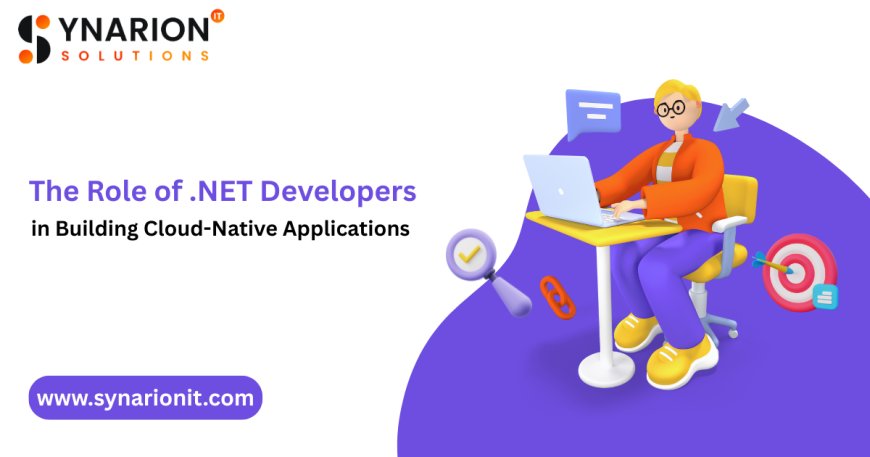The Role of .NET Developers in Building Cloud-Native Applications

As cloud computing continues to revolutionize how businesses build, deploy, and scale software, cloud-native applications have become the new standard. These applications are designed specifically for the cloud environment, offering high scalability, flexibility, resilience, and faster time-to-market. Among the many technologies that support cloud-native development, Microsoft’s .NET platform remains a strong pillar.
In this blog, we explore the critical role that .NET developers play in building cloud-native applications and why many global companies choose to hire Dot Net developers in India to meet their evolving development needs.
What Are Cloud-Native Applications?
Before diving into the role of .NET developers, it’s important to understand what cloud-native applications are. These are applications that are:
-
Built with a microservices architecture
-
Containerized using Docker or similar technologies
-
Orchestrated using Kubernetes or similar systems
-
Designed to run on scalable, elastic cloud infrastructure
-
Capable of continuous delivery and integration
Cloud-native applications leverage cloud environments such as Microsoft Azure, Amazon Web Services (AWS), and Google Cloud Platform (GCP) to offer speed, performance, and agility.
Why .NET for Cloud-Native Development?
The .NET platform, particularly with the evolution of .NET Core and the unified .NET 6/7/8 frameworks, is perfectly suited for building modern, scalable cloud-native apps. Some compelling reasons include:
-
Cross-platform support: .NET Core runs on Windows, Linux, and macOS.
-
Performance and scalability: .NET is one of the fastest web frameworks in benchmarks.
-
Built-in support for microservices and containers
-
Integration with Azure services: Seamless deployment and management on Microsoft Azure.
-
Robust tooling: With Visual Studio, GitHub Actions, and Azure DevOps, .NET provides a full DevOps ecosystem.
This is why organizations around the world, especially startups and enterprises, are increasingly looking to hire Dot Net developers in India for building cloud-native solutions that are both cost-effective and high-performing.
Key Responsibilities of .NET Developers in Cloud-Native Projects
Let’s delve into the specific roles and responsibilities that .NET developers assume when building cloud-native applications.
1. Designing Microservices Architecture
.NET developers are instrumental in creating a microservices-based architecture, where the application is broken down into small, independently deployable services. These services can be developed, updated, and scaled individually, enabling faster innovation cycles.
Using .NET 6/7 and frameworks like ASP.NET Core, developers design lightweight, high-performance APIs that serve as the foundation for cloud-native systems.
2. Containerization and Deployment
A major component of cloud-native development is containerization. .NET developers are proficient in using Docker to containerize applications and ensure they run consistently across different environments.
They also set up CI/CD pipelines using Azure DevOps, GitHub Actions, or Jenkins to automate testing and deployment processes, ensuring faster and error-free releases.
3. Building Serverless Applications
Serverless computing is a key trend in cloud-native development. With tools like Azure Functions and AWS Lambda, .NET developers can build serverless APIs, background jobs, and event-driven microservices that scale automatically based on demand.
This architecture reduces infrastructure overhead and allows teams to focus on writing business logic rather than managing servers.
4. Cloud Service Integration
Cloud-native apps often rely on various cloud services like storage, databases, messaging systems, and monitoring tools. .NET developers integrate these services smoothly using SDKs and APIs offered by cloud platforms.
For instance, a .NET developer working on Azure may integrate:
-
Azure Blob Storage for file handling
-
Azure Cosmos DB or SQL Database for data storage
-
Azure Service Bus for messaging
-
Azure Monitor for diagnostics and logging
This seamless integration adds value to the application’s robustness and scalability.
Why Hire Dot Net Developers in India?
India has emerged as a global hub for IT and software development. Businesses across the US, Europe, and Australia frequently hire Dot Net developers in India due to several compelling advantages:
1. Cost-Effectiveness
Outsourcing .NET development to India significantly reduces development costs without compromising quality. Indian developers offer world-class expertise at a fraction of the price compared to in-house teams in the West.
2. High-Quality Talent Pool
India produces thousands of engineering graduates every year. Many of them specialize in Microsoft technologies and have hands-on experience in building scalable, enterprise-grade cloud-native applications.
Indian developers are well-versed in tools like:
-
ASP.NET Core
-
Entity Framework Core
-
Docker and Kubernetes
-
Azure DevOps
-
Microservices and gRPC
3. Time Zone Advantage and 24/7 Availability
By hiring a dedicated team or developer in India, companies can leverage the time zone difference to ensure faster delivery cycles and round-the-clock support. This model works particularly well for businesses with distributed teams or tight deadlines.
4. Strong Communication and Agile Culture
Most professional developers in India are fluent in English and follow agile methodologies like Scrum and Kanban. They are accustomed to using project management tools like Jira, Trello, and Microsoft Teams for efficient collaboration.
Tools and Frameworks Used by .NET Developers in Cloud-Native Environments
.NET developers use a wide range of tools to build, test, and deploy cloud-native applications. Some of the commonly used tools include:
-
ASP.NET Core: For building APIs and web applications
-
Docker: For containerization of services
-
Kubernetes: For orchestration of containers
-
Azure DevOps: For CI/CD pipelines and version control
-
SignalR: For real-time communication
-
gRPC: For high-performance inter-service communication
-
Entity Framework Core: For database access
-
Serilog and Seq: For structured logging
These tools help in creating efficient, maintainable, and cloud-optimized applications.
Real-World Use Cases of .NET Cloud-Native Applications
.NET cloud-native development is applied across industries:
-
E-commerce: Microservices-based online platforms with scalable inventory, order, and payment services.
-
Healthcare: Secure cloud apps for patient data management and telemedicine.
-
Finance: Real-time analytics and transaction processing platforms.
-
Logistics: Fleet tracking and supply chain visibility solutions.
-
SaaS Platforms: Cloud-native CRM and ERP systems.
In each of these sectors, companies often hire Dot Net developers in India to fast-track their projects and maintain budget control.
Final Thoughts
As businesses continue to embrace digital transformation, cloud-native applications will play a central role in achieving agility, scalability, and innovation. .NET, with its mature ecosystem and cross-platform capabilities, is a preferred choice for building such applications.
.NET developers are at the heart of this transformation. They design, develop, and manage robust cloud-native architectures that meet the ever-evolving demands of the modern user.










































































![https //g.co/recover for help [1-866-719-1006]](https://newsquo.com/uploads/images/202506/image_430x256_684949454da3e.jpg)



























![[PATREON EXCLUSIVE] The Power of No: How to Say It, Mean It, and Lead with It](https://tpgblog.com/wp-content/uploads/2025/06/just-say-no.jpg?#)





















































